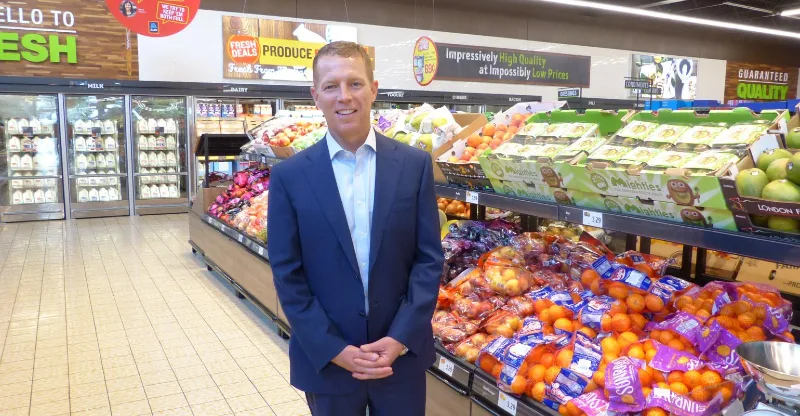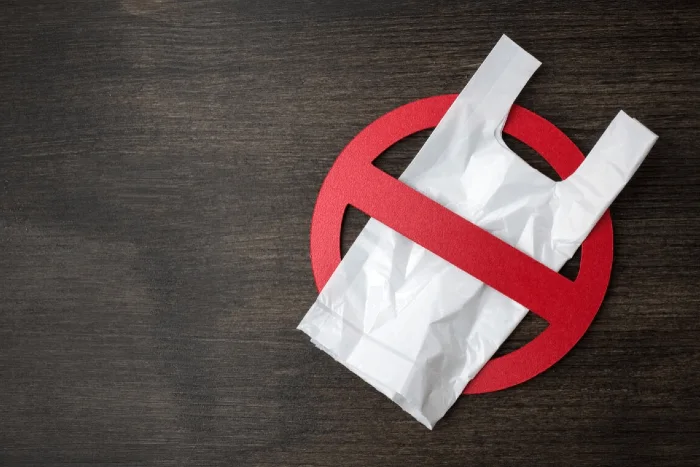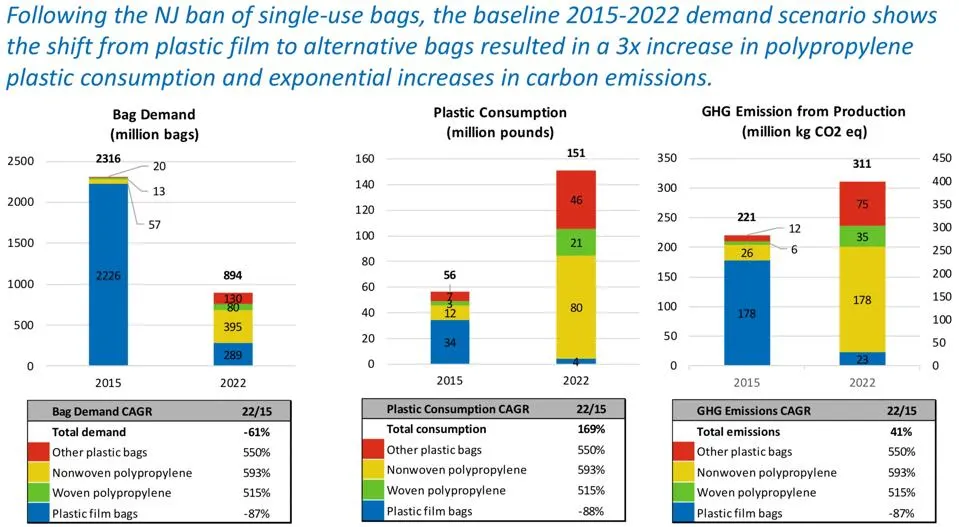New Jersey’s Struggle with Plastic Pollution: The Unexpected Consequences of the Plastic Bag Ban
In an ironic twist, New Jersey’s battle against plastic pollution intensified following the state’s ban on plastic bags in 2022. Despite the ban’s intention to curb plastic waste, a study from the business-research firm Freedonia Report, under MarketResearch.com, uncovers a worrying trend: a threefold increase in plastic consumption in the state.
Plastic Bag Ban: A Counterproductive Outcome?
The Freedonia Report’s analysis shows that while the ban successfully reduced the total volume of bags by 60%, it inadvertently led to a surge in plastic use. This increase came as residents turned to alternative plastic reusable bags. Unfortunately, these alternatives often comprised non-woven polypropylene, a material not widely recycled in the U.S. and typically devoid of post-consumer recycled content.
The New Jersey plastic bag ban, effective from May 2022, aimed to combat what Democratic Governor Phil Murphy termed the “most problematic forms of garbage.” The governor’s intention was to mitigate climate change and fortify the environment for future generations. However, the result was a sharp rise in the use of non-recyclable plastic bags.

The shift in consumer behavior was evident.
For example, Faye Franklin from Matawan switched to reusable bags, purchasing them during her grocery shopping at Stop & Shop in Aberdeen Township on the first day of the ban. Retailers, too, felt the impact. A detailed cost analysis of New Jersey grocery retailers indicated that a typical store could profit by approximately $200,000 per location from the sales of alternative bags.
For one major retailer, this translated into an estimated $42 million in profit across New Jersey.
This situation in New Jersey raises critical questions as plastic bag bans become more prevalent across the United States. While the intention of such bans is commendable, the unintended consequences demand urgent attention and action. The quest to reduce plastic pollution must consider the full lifecycle and environmental impact of alternatives, ensuring that solutions don’t inadvertently exacerbate the problem they aim to solve.
Are Plastic Bag Bans Actually Effective?
The debate over the effectiveness of plastic bag bans is heating up, as these regulations become more widespread in an effort to address environmental concerns. The National Conference of State Legislatures highlights that such bans are primarily aimed at reducing pollution and emissions from plastic production. However, the search for alternatives is leading to unintended environmental impacts.
The Freedonia Report’s study sheds light on a critical issue: the search for alternatives to single-use plastic bags often results in increased pollution. The study estimates a significant increase in purchased plastics – about 127 pounds per store per month – as a direct consequence of these regulations. This indicates a substantial shift in consumer behavior and its unintended environmental impact.
Key Findings In The Report
We read and summarized the most interesting points in the Freedonia Report, so you don’t have to.
- Significant Decrease in Bag Volumes: After the implementation of New Jersey’s single-use bag ban in 2022, total bag volumes dropped by over 60%, totaling 894 million bags.
- Tripled Plastic Consumption for Bags: Post-ban, there was a near 3x increase in plastic consumption due to the shift from plastic film to alternative bags.
- Increased Use of Non-Recyclable Material: A significant portion of these alternative bags are made from non-woven polypropylene (NWPP), which is not widely recycled in the U.S. and lacks post-consumer recycled materials.
- Environmental Impact of Material Shift: The increased use of NWPP bags led to a 500% rise in greenhouse gas emissions compared to their production in 2015.
- Comparison of NWPP and Polyethylene Bags: NWPP, the primary material for alternative bags, uses over 15 times more plastic and produces over five times the GHG emissions per bag compared to polyethylene plastic bags.
- Retailers’ Operational Changes and Profits: New Jersey retailers had to adapt their front-end operations due to the ban, leading to the sale of alternative bags. This proved profitable, with a typical store earning $200,000 per location from these sales, and one major retailer earning an estimated $42 million across New Jersey.
- Consumer Shift to Pickup and Delivery Services: The ban also influenced consumers to increasingly use grocery pickup and delivery services, which require new alternative bags for each transaction.
- Challenge in Promoting Alternative Bags: Despite the profitability, the increased plastic consumption and GHG emissions from producing alternative bags pose challenges for retailers in advocating their use.
- Inadequate Reuse Rates of Alternative Bags: On average, alternative bags are reused only 2-3 times before being discarded, not meeting the recommended reuse rates to offset the GHG emissions produced and effectively combat climate change.
Aldi Eliminates Plastic Bags Everywhere
Aldi, the discount grocery retailer, has taken a significant step by eliminating plastic shopping bags from all its 2,300 U.S. stores. This move is part of Aldi’s broader strategy to promote sustainability and encourage customers to adopt reusable bags. Aldi CEO Jason Hart emphasized the company’s commitment to leading the industry in sustainability.
“As one of America’s fastest-growing retailers, we take our responsibility to lead the industry in sustainability seriously, so our customers don’t have to choose between shopping responsibly and saving money,” Hart stated. This decision not only aims to protect the environment but also reduces costs, which Aldi passes on to customers.
Aldi’s sustainability initiatives don’t stop at bag elimination. The company has committed to using natural refrigerants in all its U.S. stores by 2035. This move supports a healthier planet and ensures product freshness. Already, over 600 stores have adopted eco-friendly refrigerants, potentially saving almost 60 percent of carbon emissions annually.

Reflecting on the True Impact of Plastic Bans
The case of Aldi, along with the broader trend in New Jersey, highlights a complex dilemma that’s starting to be felt across the nation. While banning single-use plastics is a step towards sustainability, the real challenge lies in managing the consequences of such decisions. After all, it’s just as likely that the alternatives to plastic bags don’t lead to greater environmental damage, thus negating the benefits of the ban.
Aldi’s decision to remove plastic shopping bags from its stores is a leap in the fight against plastic pollution, that’s true. And it’s been great publicity for the nation’s fastest growing grocer. In fact, this move alone is projected to prevent almost 4,400 tons – nearly 9 million pounds – of plastic from entering circulation each year. Commendable, to say the least!
Aldi’s offers cloth bags for sale and continues to provide bags for customers who forget their reusable ones. This strategy of being prepared for a forgetful customer or one that hasn’t embraced sustainability has turned out to be the sweet spot between promoting environmental responsibility and acknowledging customer habits.
Aldi’s initiative is part of a broader trend among major retailers.
- Walmart has stopped offering single-use plastic bags in select states, including New York, Connecticut, and parts of Colorado. Instead, Walmart encourages customers to bring their own bags or offers reusable shopping bags for purchase.
- Stop & Shop has also joined the movement, planning to eliminate single-use plastic bags at its Northeast stores. This decision aligns with the retailer’s environmental goals, although it now charges customers for paper bags and has noticed a slight uptick in profits because of it.
- Wegmans, which eliminated plastic bags in 2022, has shifted its focus entirely to reusable bags with little pushback from its customer base.
While the effectiveness of plastic bag bans in reducing overall plastic consumption remains debated, the proactive stance by these companies demonstrates their commitment to a greener future.
More To Discover
Aldi’s and other retailers’ efforts to reduce plastic bag usage are a testament to the evolving consumer and corporate awareness about the environmental impact of plastic. As more companies adopt similar policies, it’s expected that the trend will continue to grow, potentially leading to more significant changes in consumer behavior and a reduction in plastic pollution over time.
Source: Freedonia Report




















